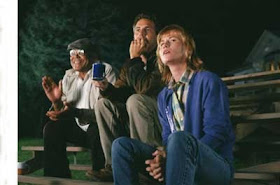
WHISTLE DOWN THE WIND (1961, UK, Bryan Forbes)
He's not your private property. Everyone can see him if they want.
This Hayley Mills vehicle – adapted from a novel her mum wrote – has a much darker tone than you might expect. When three Lancashire children decide the man in their barn is Jesus, they form a secret society to keep the truth from the grown-ups, "Cause if you don't, they'll come and take him away again like last time." And no wonder: their surly father and overbearing aunt are as hard as the land they farm. Filmed in black and white, it's all dreary hills and rock quarries under oppressive grey skies.
These children lead a secret life, ducking out of view of the adult world that carries on around them, mostly oblivous. Left to their own devices, they hammer things out in a curious blend of childhood innocence and pragmatic bloody-mindedness. Clearly, Jesus needs food: if that means stealing some bread and wine for him, so be it. " Do you think it's wicked?" "No. How can it be when we're doing it for him?"
Out of the mouths of babes. One immediately thinks of the evils and compromise that have been justified with the same easy logic – while also being reminded of the words of Christ, "Inasmuch as you have done it to the least of these my brothers, you have done it to me."
Alan Barnes, who had never seen a script before, plays the tough-minded little brother who pretty much steals the movie out from under Miss Mills and even the haunted, hunted performance of Alan Bates as "The Man." He's the tough, clear-sighted boy who'll prove, sadly and inevitably, father to the stony Lancashireman he'll inevitably become. Or maybe there's more spirit in him than that. Certainly his sheer spunk brings endless, sharp comedy to the film. He shushes a chattering gaggle of village children on their way to the stable: "Do you want to see Jesus or don't you? Well, shut up then." He disarms his younger sister's qualms that "Jesus wore a long dress" with the simple observation that "That was in them days."
I'm not sure the climax of the film works all that well – though a comparison to WITNESS is interesting. But the world of the film is unique, and for all its simplicity it grows richer on repeat viewings. Perhaps the film escapes the expected coyness because we are constantly aware that the man in the barn is not Jesus – he may even be an escaped criminal – and the convolutions the children indulge to sustain belief take the piss out of adult "true believers." At the same time their simple loving concern for this man has an undeniable sacredness about it. There's a thin line between serving Jesus and visiting a criminal, whether in a stable or in a prison.
VHS only available at Videomatica






